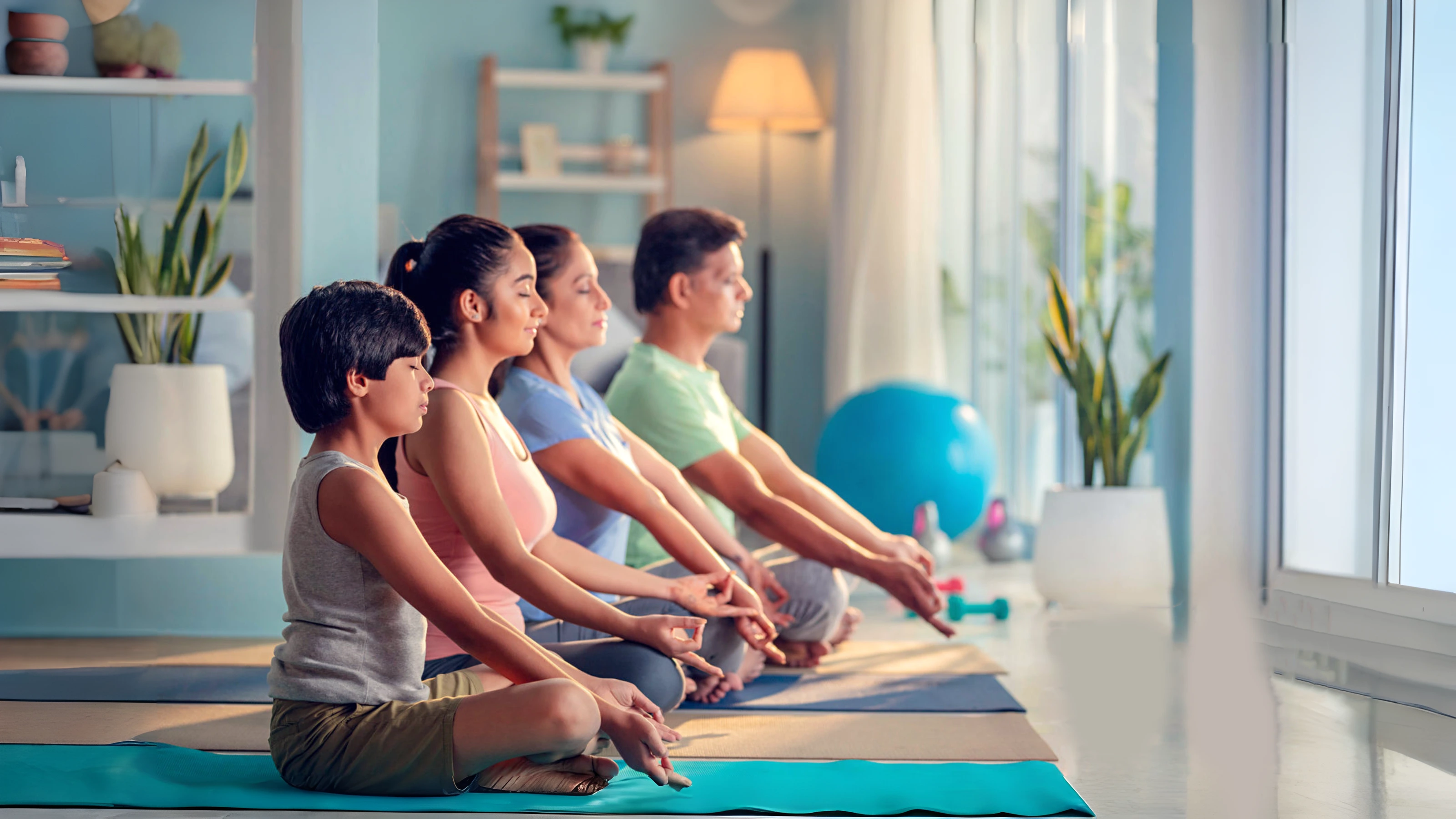
How Does Practicing Yoga Daily Impact Your Mental Health?
- 20 Feb 2025
- Yoga
Many people underestimate the profound effects that daily yoga practice can have on mental health. I’ve found that dedicating just a few minutes each day to yoga can help alleviate stress, improve my mood, and enhance my overall sense of well-being. As I connect my breath with movement, I feel a powerful release of tension that lifts my spirits and sharpens my focus. In this blog post, I’ll share how practicing yoga daily can transform not just your body, but also your mind, leading to a more balanced and joyful life.
Key Takeaways:
- Reduced Stress: Daily yoga practice can significantly lower levels of stress and anxiety, leading to a calmer mindset.
- Improved Mood: Engaging in yoga helps increase the release of endorphins, enhancing overall emotional well-being.
- Enhanced Mindfulness: Regular practice fosters greater self-awareness and mindfulness, contributing to improved mental clarity and focus.
The Benefits of Daily Yoga for Mental Health
The daily practice of yoga offers numerous benefits for mental health, providing a holistic approach to personal well-being. By integrating mindfulness and physical movement, yoga can enhance your mental clarity, boost your resilience against stress, and foster a deeper emotional connection with yourself. You'll likely find that the consistency of your practice supports a greater sense of peace and balance in your daily life.
Reducing Stress and Anxiety
Against the backdrop of our busy lives, yoga serves as a sanctuary where I can retreat and recharge. As I learn to control my breath and focus my mind, I've noticed a tangible reduction in my stress and anxiety levels. This calming practice allows me to let go of tension, enabling a more tranquil state of being that spills into my everyday interactions.
Enhancing Mood and Emotional Well-being
To elevate my mood, I find that daily yoga not only uplifts my spirit but also fosters a positive outlook. The combination of physical postures, deep breathing, and meditation helps me cultivate an emotional sanctuary where I can process my thoughts and feelings. Daily yoga practice can lead to increased levels of serotonin, the happiness hormone, promoting a sense of well-being and joy. As I engage in my sessions, I often feel a wave of renewed energy and optimism, allowing me to approach challenges with a healthy mindset and a smile on my face.
Daily yoga has transformed my emotional landscape in profound ways. I've discovered that it not only improves my mood but also significantly enhances my overall emotional well-being. Each time I step onto the mat, I'm not just engaging in physical exercise; I'm actively practicing self-care. This regular habit has become a vital part of my routine, contributing to feelings of happiness and reducing the negative impacts of stress on my mind and body. With the compassionate practice of yoga, I can navigate life's ups and downs more gracefully, enjoying a positive relationship with myself and others.
Building Mindfulness Through Yoga
One of the most profound benefits of daily yoga practice is its ability to cultivate mindfulness. As I flow through each pose, I become more attuned to my body and breath, allowing me to savor the present moment. This awareness extends beyond my mat, helping me manage stress and anxiety in my everyday life. By prioritizing mindfulness, I develop a deeper connection with myself and the world around me, enhancing my overall well-being.
Cultivating Present-Moment Awareness
An imperative aspect of mindfulness in yoga is present-moment awareness. Through focused breathing and intentional movements, I learn to let go of distractions and immerse myself in the here and now. This practice enables me to navigate life's challenges with a calmer and clearer mindset.
Developing a Positive Mindset
The process of practicing yoga daily fosters a positive mindset that can significantly impact my mental health. As I engage in this mindful movement, I often find myself embracing gratitude and joy, even amidst life's obstacles. This transformation allows me to respond to situations with a more open heart and mind.
Even simple yoga sessions can shift my perspective, enabling me to focus on the positive aspects of life. By setting intentions at the start of each practice, I begin to cultivate an optimistic outlook that influences my daily interactions. The more I practice, the more I notice how I react to stressors with resilience and compassion. Ultimately, this positive mindset not only enhances my yoga practice but also enriches my relationships and overall happiness.
Yoga's Role in Improving Sleep Quality
To enhance your sleep quality, incorporating daily yoga into your routine can work wonders. The gentle movements and deep breathing exercises help calm your mind and body, making it much easier to drift off into a restful slumber. By alleviating stress and tension, yoga not only prepares you for sleep but also promotes a deeper, more restorative sleep cycle, allowing you to wake up feeling refreshed and rejuvenated.
The Connection Between Yoga and Restorative Sleep
The connection between yoga and restorative sleep is deeply intertwined. Engaging in yoga helps lower adrenaline levels and cortisol, the stress hormone, while increasing the production of serotonin, which can improve your mood and help you unwind at bedtime. This shift in body chemistry fosters relaxation, creating the ideal conditions for a peaceful night’s sleep.
Techniques for Better Sleep Through Yoga
Improving your sleep through yoga can be as simple as incorporating a few key practices into your evening routine. Focus on restorative poses, such as Child’s Pose and Legs-Up-The-Wall, slowing your breath with each stretch to foster a sense of calm. Meditation and mindfulness techniques are also beneficial, allowing your mind to release daily stresses and focus on relaxation.
But to truly maximize the impact of yoga on your sleep, try creating a calming evening routine that includes gentle stretches, such as Forward Bends, to release tension in your back and improve circulation. Incorporating pranayama breathing exercises can also lower your heart rate and prepare your mind for sleep. Always pay attention to your body; if you feel any pain or discomfort, adapt your poses to ensure a safe and restorative practice. Consistency is key, so aim to establish a routine that promotes relaxation and well-being at bedtime.
Social Connections and Community in Yoga
Now, practicing yoga goes beyond the mat; it fosters connections and builds a supportive community. Joining a yoga class introduces you to a diverse group of people who share similar values of mindfulness and wellness. This sense of belonging not only enhances your practice but also enriches your life through new friendships.
Finding Support through Group Practices
Before trying yoga, I didn’t realize how much I would benefit from a supportive community. Practicing in a group allows you to feel a sense of camaraderie, as you all work together toward individual and collective goals. This shared journey can be a great source of encouragement and motivation!
Strengthening Relationships through Shared Experience
Social connections flourish through shared experiences in yoga. Through these classes, I’ve noticed how spending time with fellow practitioners creates a bond that transcends casual acquaintances. Engaging in poses together, sharing laughs during class, and even tackling challenges as a team foster feelings of trust and understanding. These interactions often lead to lasting friendships that extend beyond the mat, contributing to a more fulfilling social life.
Overcoming Mental Barriers with Regular Practice
All of us face mental barriers that can hinder our growth and well-being. Through daily yoga practice, I discovered that these barriers diminish over time. Each session provides an opportunity to connect with my breath and body, helping me to unlock the mental blocks I've carried. With consistency, I learned to embrace challenges rather than shy away from them, paving the way for a more vibrant and fulfilling life.
Building Resilience and Confidence
Behind every successful yoga practice is the development of resilience and confidence. As I continue to push my limits on the mat, I find that I become more adept at handling obstacles in my daily life. The strength I cultivate during each session translates into greater self-assurance, allowing me to face hardships with a newfound determination.
Making Yoga a Sustainable Habit
Above all, creating a sustainable yoga practice requires dedication and a bit of creativity. It’s vital to find what works for you, whether that's setting a specific time or exploring different styles that resonate with you. Mixing it up keeps things exciting and helps me stay engaged in my journey.
Regular practice is key to making yoga a sustainable habit in your life. Establishing routine can help make yoga a non-negotiable part of your day. I’ve found it helpful to set reminders, join a community, or even share my journey with friends. This support system keeps me motivated and accountable. Additionally, choosing variations that fit your energy levels keeps the practice enjoyable and makes it easier to return to the mat consistently. As I cultivated this habit, I experienced significant benefits not only physically but also in my mental well-being.
Self-Care Rituals: Incorporating Yoga into Daily Life
Not only does yoga promote mindfulness, but it also acts as a wonderful self-care ritual that can be easily integrated into your daily routine. By setting aside just a few minutes each day for your practice, you’ll begin to notice the profound positive effects on your mental well-being, allowing you to handle daily stressors with more grace and ease. Whether it's a morning flow or an evening cool-down, yoga can be the anchor you need to nurture yourself in today’s fast-paced world.
Simple Practices for Busy Schedules
For those of us juggling busy lives, incorporating yoga does not have to be time-consuming. A simple five-minute stretch or a quick breathing exercise during your lunch break can be incredibly refreshing. I've found that just a few deep breaths and a few gentle movements can uplift my mood and help me refocus, making it easier to tackle my day.
Creating a Personal Yoga Space at Home
Into your home, I encourage you to carve out a special corner dedicated to yoga. This space doesn't have to be large, but having a designated area can turn your practice into a cherished ritual. You might choose to add a mat, some cushions, and a few calming elements like plants or candles to enhance your experience.
It can be incredibly fulfilling to create a personal yoga space at home. By choosing a quiet corner, free from distractions, you can transform it into a peaceful sanctuary for your practice. Add elements that inspire you, such as your favorite yoga mat, soft lighting, or soothing scents with necessary oils. This space will not only motivate you to practice more often but also provide a sense of comfort and tranquility. With your personal yoga nook ready, you'll find it easier to dedicate time to self-care and establish a routine that nurtures your mental health.
To wrap up
Considering all points, I truly believe that practicing yoga daily can transform your mental health for the better. By offering a space for self-reflection and stress relief, yoga helps you feel calmer and more centered. You might find that your anxiety decreases and your mood lifts, giving you a brighter outlook on life. Embracing this practice not only enhances my overall well-being but also encourages me to stay connected with myself. So, why not give it a try and experience these benefits for yourself?
Q: How does practicing yoga daily improve mood and reduce anxiety?
A: Engaging in daily yoga practice promotes the release of endorphins, hormones that enhance mood and reduce feelings of anxiety. The combination of physical movement, breath control, and mindfulness helps individuals manage stress more effectively. Additionally, the meditative aspects of yoga allow practitioners to create mental space, facilitating a greater sense of inner peace and emotional balance, which can lead to an overall improvement in mood.
Q: Can daily yoga practice enhance emotional resilience?
A: Yes, daily yoga practice can significantly enhance emotional resilience. By encouraging individuals to focus on the present and accept their thoughts and feelings without judgment, yoga fosters a non-reactive mindset. This helps practitioners build coping skills to navigate stressful situations and adversity. Over time, such consistent practice can lead to a stronger ability to handle life's challenges, promoting better emotional health.
Q: In what ways does yoga support mindfulness and self-awareness?
A: Daily yoga practice emphasizes the connection between the body and mind, thereby cultivating mindfulness and self-awareness. Through intentional breathing and focused movements, practitioners learn to tune into their physical sensations and mental states. This heightened awareness can lead to better emotional regulation, as individuals learn to identify and understand their feelings. Over time, this practice can help individuals develop a deeper understanding of themselves, fostering personal growth and a more positive mental outlook.
Cookies Consent
This website use cookies to help you have a superior and more relevant browsing experience on the website. Read more...




